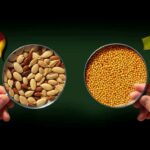At first, we thought seeds were just tiny things we sprinkled on salads or used in our bread recipes. But we were wrong! These little wonders are actually packed with nutritional benefits. In this article, we will explore the world of 100g seeds, looking at their protein, fiber, omega-3 fatty acids, antioxidants, and mineral content.
Prepare to be amazed by the incredible ways these seeds can boost your health and well-being. Let’s get started!
Key Takeaways
- Chia seeds are a rich source of fiber, with 34 grams per 100 grams, making them beneficial for digestive health and promoting regular bowel movements.
- They are high in omega-3 fatty acids, with 18 grams per 100 grams, which can contribute to heart health by helping to lower LDL cholesterol levels and reducing the risk of cardiovascular events.
- Chia seeds are packed with antioxidants, including flavonoids, which can help protect against free radicals and reduce inflammation in the body. This increased antioxidant intake may positively impact cardiovascular health.
- Chia seeds are a good plant-based protein source, containing 16 grams of protein per 100 grams. This makes them beneficial for vegetarians and vegans who may struggle to obtain enough protein from other plant-based sources.
Protein Content of Chia Seeds
We found that chia seeds contain a significant amount of protein, with approximately 16 grams per 100 grams of seeds. Protein is an essential nutrient that plays a crucial role in building and repairing tissues, as well as supporting the immune system.
Including chia seeds in your diet can contribute to meeting your daily protein needs. Chia seeds are particularly beneficial for vegetarians and vegans who may struggle to obtain enough protein from plant-based sources. Additionally, chia seeds are a complete protein, meaning they provide all the essential amino acids our bodies need. This makes them an excellent option for those looking to increase their protein intake.
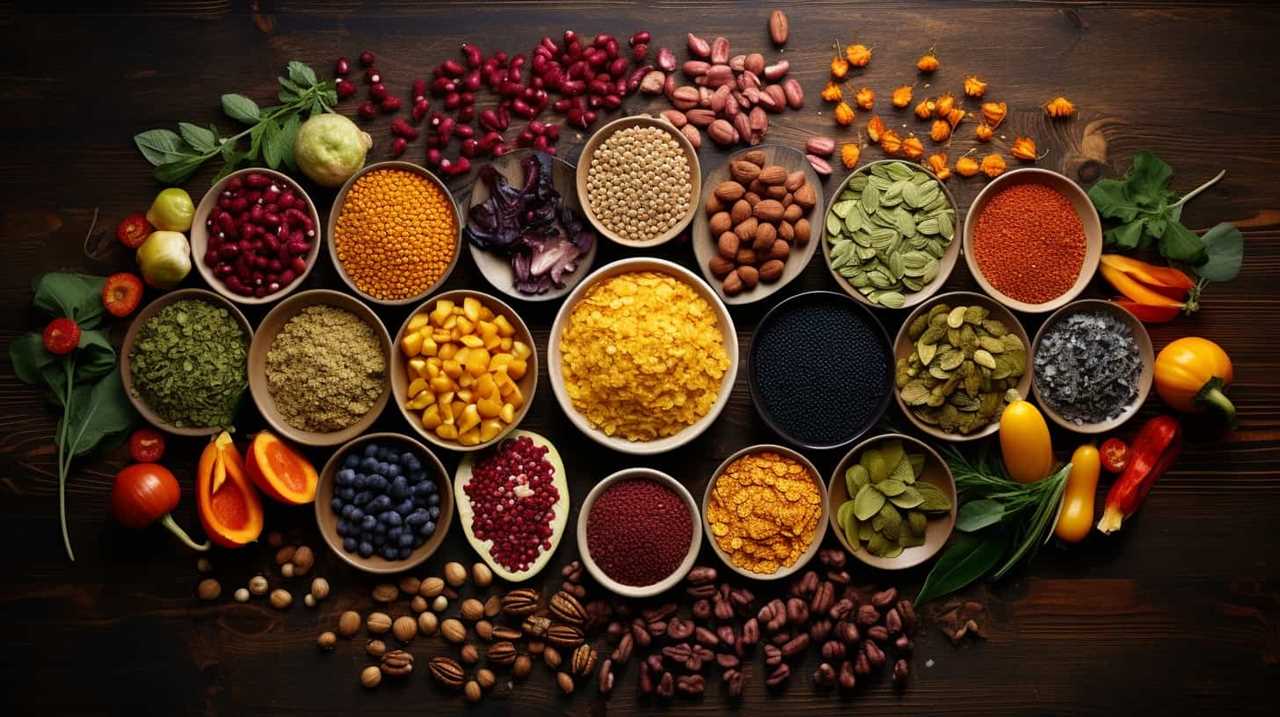
Incorporating chia seeds into your meals and snacks can help enhance the nutritional value of your diet and promote overall health and well-being.
Fiber Content of Chia Seeds
Chia seeds contain a high amount of fiber, making them an excellent source for meeting our dietary fiber needs. Fiber is an essential nutrient that aids in digestion and helps maintain a healthy weight. Incorporating chia seeds into our diet can provide numerous nutritional benefits.
To illustrate the fiber content of chia seeds, let’s take a look at the following table:
| Nutrient | Amount per 100g |
|---|---|
| Fiber | 34.4g |
| Protein | 16.5g |
| Fat | 30.7g |
As seen in the table, chia seeds are packed with fiber, providing 34.4g per 100g. This high fiber content helps regulate blood sugar levels, improve digestion, and promote a feeling of fullness, aiding in weight management. Additionally, the fiber in chia seeds acts as a prebiotic, supporting a healthy gut microbiome.

Incorporating chia seeds into our daily diet can be a simple and effective way to boost our fiber intake and reap the potential health benefits associated with consuming these nutrient-rich seeds.
Omega-3 Fatty Acid Content of Chia Seeds
Chia seeds are rich in omega-3 fatty acids, providing a significant amount per 100g. Omega-3 fatty acids are essential fats that play a crucial role in maintaining heart health, reducing inflammation, and supporting brain function.
Consuming chia seeds can be an excellent way to boost your omega-3 intake. The recommended daily intake of omega-3 fatty acids from chia seeds varies depending on individual needs and overall diet. However, incorporating around 20g of chia seeds into your daily meals can help you meet your omega-3 requirements.
It’s important to note that while chia seeds offer numerous health benefits, consuming them in excess may have potential side effects, such as digestive issues or allergic reactions. As with any dietary change, it’s best to consult with a healthcare professional before making significant adjustments to your diet.

Antioxidant Content of Chia Seeds
The antioxidant content of chia seeds is a significant factor in their overall health benefits. Chia seeds are rich in antioxidants, which are compounds that help protect our cells from damage caused by free radicals. These free radicals can contribute to the development of chronic diseases such as heart disease and cancer.
By consuming chia seeds, we can increase our intake of antioxidants, which may have a positive impact on our cardiovascular health. Antioxidants help reduce inflammation and oxidative stress, both of which can contribute to the development of heart disease.
Including chia seeds in our diet can be a simple and practical way to boost our antioxidant intake and support our overall well-being.
Mineral Content of Chia Seeds
Including chia seeds in our diet can also provide us with a rich source of essential minerals. These tiny seeds pack a powerful punch when it comes to mineral content. Here are three minerals you can find in chia seeds:
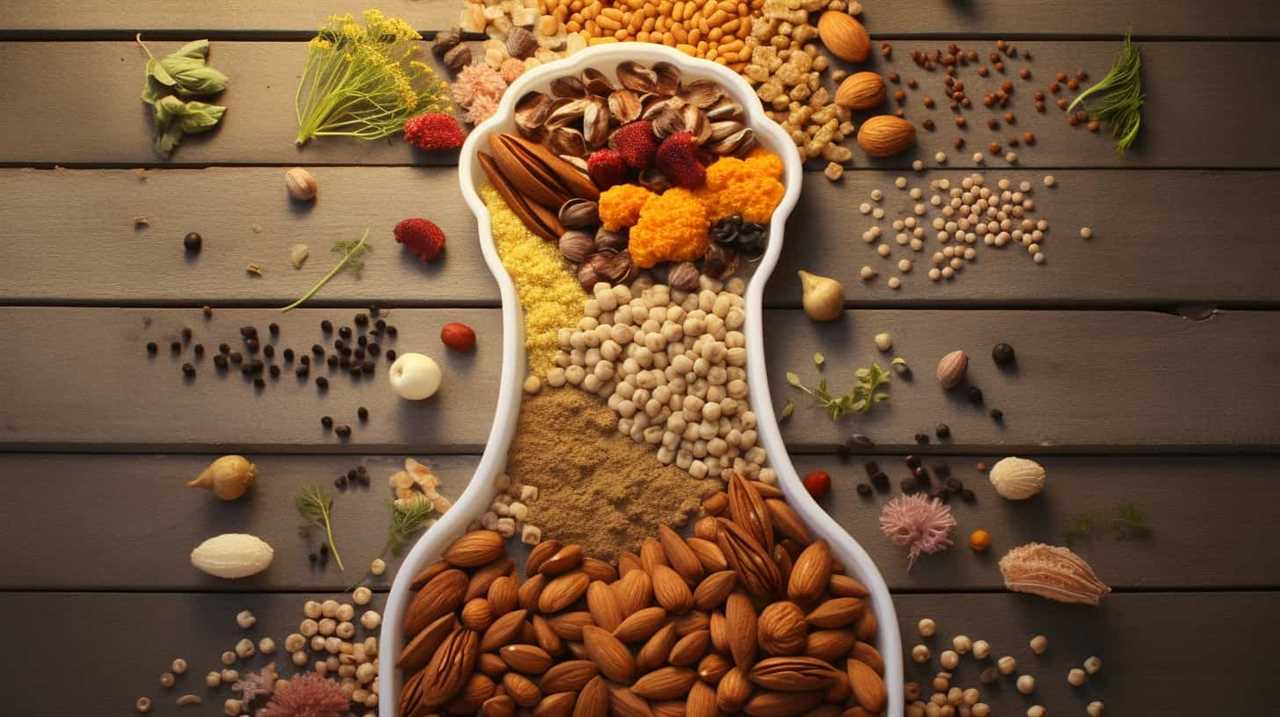
-
Calcium: Chia seeds are an excellent source of calcium, which is essential for strong bones and teeth. In fact, just 100 grams of chia seeds contain around 631 milligrams of calcium, which is more than double the amount found in the same serving size of milk.
-
Magnesium: Chia seeds are also a great source of magnesium, a mineral that plays a crucial role in various bodily functions. With approximately 335 milligrams of magnesium per 100 grams, chia seeds provide a significant amount to help support muscle and nerve function, regulate blood sugar levels, and maintain a healthy immune system.
-
Phosphorus: Chia seeds are rich in phosphorus, with about 860 milligrams per 100 grams. Phosphorus is necessary for the formation and maintenance of healthy bones and teeth, as well as for energy production and DNA synthesis.
When comparing the mineral content of chia seeds with other seeds, it’s clear that chia seeds are a nutritional powerhouse. However, it’s important to note that consuming chia seeds in excessive amounts may have potential health risks, such as digestive issues or allergies. It’s best to consume chia seeds in moderation and consult with a healthcare professional if you have any concerns.
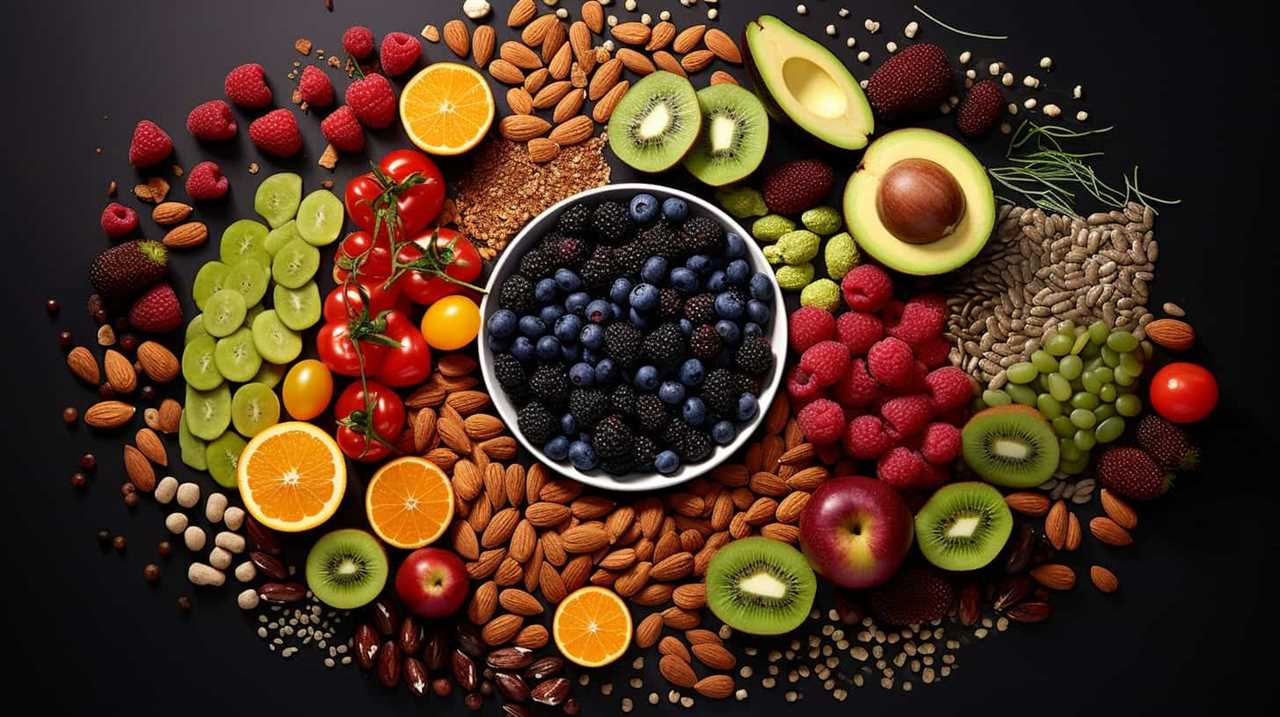
Frequently Asked Questions
Can Chia Seeds Help With Weight Loss?
Chia seeds can help with weight loss as they boost metabolism and increase satiety. Research shows that chia seeds absorb water and expand in the stomach, promoting feelings of fullness and reducing calorie intake.
Are Chia Seeds Safe for Individuals With Nut Allergies?
Chia seeds are generally safe for individuals with nut allergies, as they are not nuts but rather seeds. However, it is always best to consult with a healthcare professional before consuming them, especially during pregnancy.
Can Consuming Chia Seeds Improve Skin Health?
Chia seeds have been shown to improve skin health by promoting hair growth and reducing inflammation in the body. Incorporating chia seeds into our diet may be a practical way to enhance our overall well-being.
Are Chia Seeds Suitable for Individuals Following a Gluten-Free Diet?
Chia seeds are suitable for individuals following a gluten-free diet. They have a high nutritional value, containing fiber, protein, and omega-3 fatty acids. Additionally, chia seeds can be used as an egg substitute in recipes.
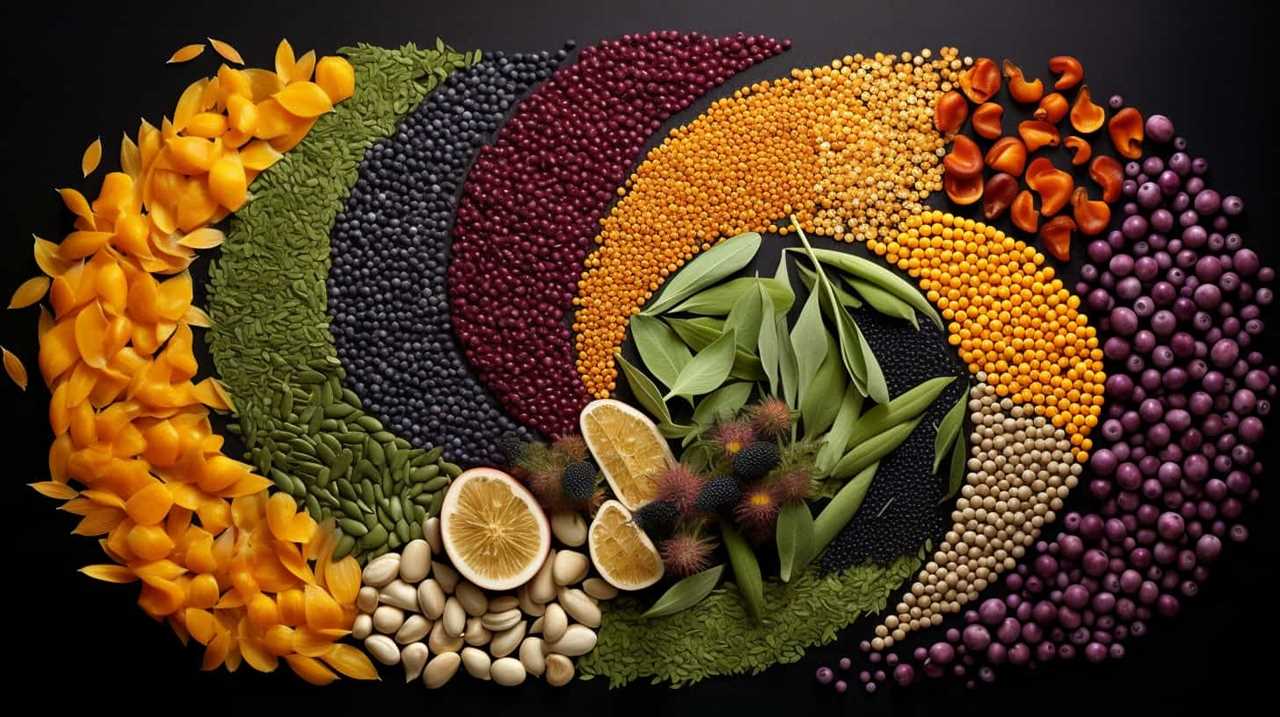
Can Chia Seeds Help Regulate Blood Sugar Levels?
Chia seeds can help regulate blood sugar levels by reducing insulin resistance. They have been studied for their potential role in managing diabetes. Incorporating chia seeds into a balanced diet may be beneficial.
Conclusion
Incorporating just 100 grams of seeds into your diet can unlock a treasure trove of health benefits. Packed with protein, fiber, omega-3 fatty acids, antioxidants, and essential minerals, seeds like chia can be a game-changer for your well-being.
They offer a harmonious symphony of nutrients that can support your body in countless ways. So, why not sprinkle some seeds into your meals and let your health flourish like a vibrant garden?



